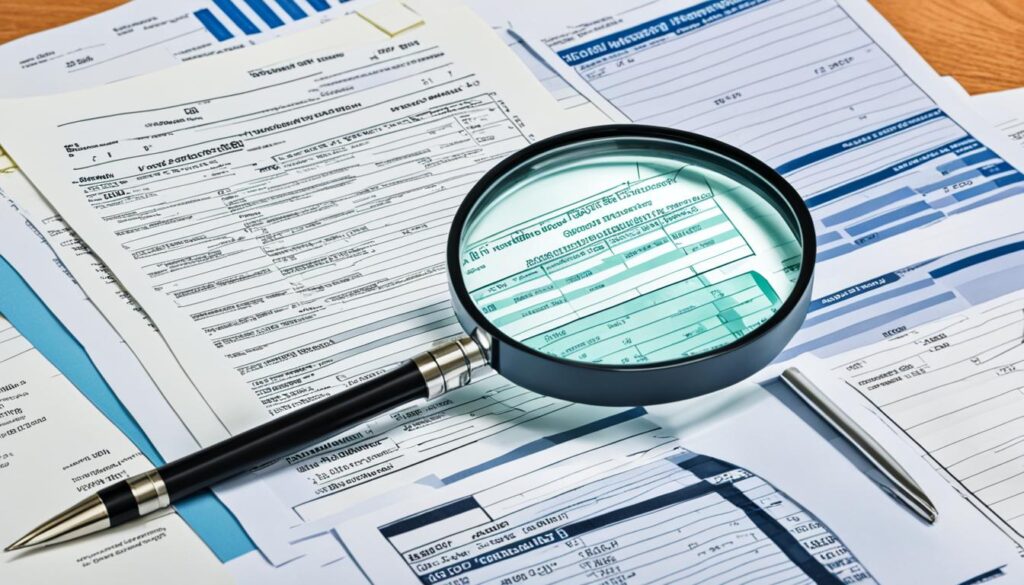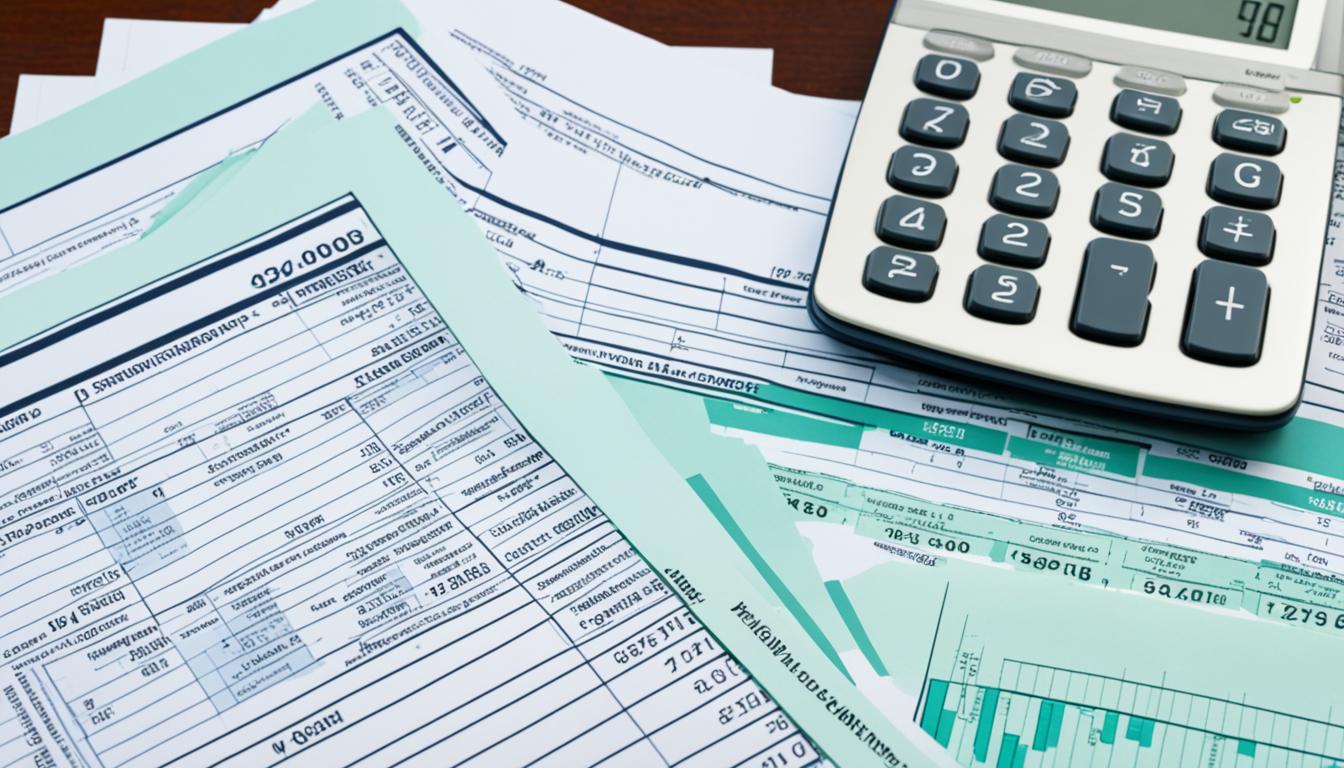Hyderabad , India
Have you ever thought about the risks of not keeping your tax records in order? At the heart of good *tax management* is having accurate tax records. Many don’t see their importance until it’s too late. At Am Accountable, we know how vital it is to keep your tax records right. This is key for staying in line with the law and for your financial health.
We offer virtual accounting services for startups in India. We help you set up a strong system for keeping financial records. This makes handling tax compliance much easier.
Having accurate tax records makes tax preparation and filing smooth. It reduces the risk of mistakes that could lead to audits or fines. They help us keep a close eye on your income and expenses. This ensures we stay in control of our finances and make the most of deductions.
In today’s uncertain economic times, keeping detailed records is a must. It’s not just a good idea; it’s crucial for protecting your business’s future.
Key Takeaways
- Accurate tax records are crucial for legal compliance and avoiding penalties.
- Effective financial recordkeeping aids in tracking income and expenses.
- Meticulous documentation enhances financial transparency and control.
- Potential tax deductions can significantly save money through accurate records.
- Investing in tax management tools streamlines the recordkeeping process.
Understanding Accurate Tax Records
Accurate Tax Records are key for taxpayers to follow tax laws. In India, these records help the government collect taxes. This money supports public services. Knowing what tax records we need helps us prepare for audits and tax queries.
Types of Tax Records
We need to know the types of Tax Documentation needed for filing taxes. These include:
- Income statements such as salary slips and invoices
- Expense receipts supporting deductible expenditures
- Bank statements reflecting account activities
- Previous years’ tax returns
- Relevant forms like Form 16 and Form 26AS
Keeping these documents ready and in order is crucial. This is especially true when making advance tax payments during the year. Important due dates for this year are:
| Instalment | Due Date | Percentage of Tax Liability |
|---|---|---|
| 1st Instalment | June 15, 2024 | 15% |
| 2nd Instalment | September 15, 2024 | 45% (30% of remaining liability) |
| 3rd Instalment | December 15, 2024 | 75% (30% of remaining liability) |
| 4th Instalment | March 31, 2025 | 100% (Remaining liability) |
To pay income tax online, we need documents like the Aadhaar Card and PAN Card. We also need forms showing our income and investments. Payment options include net banking and debit cards, making it easy and secure.
It’s vital to fix any mistakes in tax challans within a week of payment. Keeping up with the Income Tax Department’s latest news helps us follow the rules. For more info on paying income tax challans, check out the payment process.
Why Accurate Tax Records Matter for Tax Compliance
Keeping accurate tax records is more than just a task. It’s crucial in today’s complex tax world. If records are wrong or missing, it can lead to big problems. It can make us fail in tax compliance and bring audit risks and legal troubles.
Legal Implications and Compliance Requirements
Businesses must keep precise records to follow the law. In India, for example, they need to follow GST and Income Tax laws. If they don’t, they could face big fines and more tax authority checks.
Good records help us prove our claims and transactions during audits. They also help us keep up with tax law changes. This careful approach helps us avoid breaking the law.
By focusing on accurate tax records, we can handle tax laws better. It helps us stay disciplined financially and avoid mistakes that could lead to fines or legal issues. Meeting our tax duties is easier with good recordkeeping in today’s changing financial world.
The Role of Financial Recordkeeping in Business Success
Keeping accurate financial records is key for businesses wanting to succeed over time. It helps us understand our finances better, making budgeting, forecasting, and planning easier. This way, we can make smart choices and adjust our strategies when needed.
Benefits of Effective Recordkeeping
Good financial records have many uses. They make it clear to people outside the company and potential investors how strong our business is. Here are the main benefits of keeping good financial records:
- Enhanced Decision-Making: With the latest financial info, businesses can check how they’re doing and change their plans if needed.
- Compliance Assurance: Keeping accurate tax records helps us follow the rules, lowering the chance of fines or audits.
- Improved Operational Efficiency: Keeping records well helps save time and cut down on mistakes, letting us focus on what we do best.
- Financial Forecasting: Using past data, we can guess what the future might bring, helping us plan better and track our progress.
- Informed Investment Decisions: Clear records build trust and can help bring in investors.
These points show why keeping good financial records is so important. Working with experts in financial management can help us handle our records well. At GSN Consultancy, we offer custom financial management solutions for your business. Our team makes sure your records are right and follow the latest rules.
| Benefit | Description |
|---|---|
| Enhanced Decision-Making | Access to accurate data for informed strategy adjustments. |
| Compliance Assurance | Reduction of risks associated with tax penalties and audits. |
| Improved Operational Efficiency | More time for core operations reduces errors and stress. |
| Financial Forecasting | Ability to predict trends and mitigate financial uncertainties. |
| Informed Investment Decisions | Attracts trust through transparent financial documentation. |
To protect our financial future, let’s focus on good financial recordkeeping. Keeping accurate tax records helps us do better in business and stand out in the market.
IRS Filing and the Necessity of Accurate Documentation
Filing season is here, and having precise tax documents is key. These records help us follow tax laws and prepare for IRS filing. By collecting all needed documents, we avoid mistakes and stay on track for deadlines. This helps reduce stress and keeps us responsible for our finances.
Preparing for Filing Season
Getting ready for filing season means gathering important papers like income statements and expense receipts. Keeping everything organised is crucial. It helps us file correctly and avoid mistakes. If there are errors, we could face an audit, which is stressful.
Keeping good records is not just for individuals. Small business owners must also be transparent with their finances. Starting a separate business bank account is a good step. The U.S. Small Business Administration says it makes tax time easier and helps track finances better.
Improving our financial knowledge is important for IRS filing. Keeping accurate records helps us follow the law and avoid legal issues. We should always get better at managing money for better decisions in life. For more tips, check out the importance of financial literacy.
Utilising Bookkeeping Software for Efficient Tax Management
Keeping accurate financial records is key to good tax management. Using bookkeeping software helps us manage taxes better, making the process smoother and less stressful. Tools like Tally and Zoho Books offer features that make our tax work easier and more accurate.
Features of Effective Bookkeeping Tools
Today’s bookkeeping software has many features to help with our finances. These include:
- Automatic Categorisation of Expenses: This makes organising our money easy, cutting down on mistakes.
- Income Tracking: We can keep an eye on our income in real-time, making sure we don’t miss anything.
- Financial Report Generation: Detailed reports give us a clear view of our finances, helping us make better choices.
- Data Retention and Retrieval: Keeping records safely and easily accessible is a big help during audits, keeping us in line and avoiding problems.
These features in our bookkeeping software make managing taxes easier. Fewer mistakes mean less time wasted and more accuracy, giving us confidence during audits. With these powerful tools, we can grow our business and stay on top of our tax duties.
| Feature | Description | Benefits |
|---|---|---|
| Automatic Categorisation | Organises expenses based on predefined categories. | Reduces manual errors, saves time. |
| Income Tracking | Monitors cash flow in real-time, showing incoming funds. | Prevents overlooked income, improves cash management. |
| Financial Reporting | Generates insights into the financial health of the organisation. | Aids in strategic decisions and financial planning. |
| Data Retention | Keeps records secure and easily retrievable. | Eases audit processes, ensures compliance. |
Auditing Services and the Importance of Record Accuracy
Using auditing services is key to keeping our finances in check. In India, the Companies Act, 2013, says every company must have accurate books and get audited every year. This shows how vital it is to keep records right during audits. If there are mistakes, it can lead to big problems, making it clear how important it is to document things correctly.

Having accurate tax records is the base for a good audit. The Income Tax Act, 1961, demands strict adherence for keeping trustworthy financial records for taxes. Companies also need to follow the Goods and Services Tax (GST) Act, 2017, which means keeping detailed records and getting audited regularly. Internal audits help improve our controls to reduce risks, while external audits check our financial statements for truth and openness. Regular checks spot any weak spots in our accounting.
Preparing for a Successful Audit
To get ready for an audit, we must make sure our financial records are spotless. Good bookkeeping lets auditors do their job well. They check our entries against documents to make sure our financial statements are correct. Keeping our records accurate makes the audit process smoother and shows we’re serious about following the rules and being open.
If you need help with virtual accounting services for startups in India, we’re here at Am Accountable. Call us at 91 91778 42756 or email info@amaccountable.com. Book a free discovery call at www.amaccountable.com to see how we can boost your financial health.
Tax Preparation: How Accurate Records Can Save You Money
Keeping accurate records is key in tax preparation. It helps us claim deductions and credits, which can lower our tax bill. By tracking our finances well, we can make the most of tax benefits.
Deductions and Credits
It’s vital to have clear records for deductions and credits. For example, business expenses like marketing, equipment, and more need to be well-documented. This ensures we don’t miss out on deductions that could help our finances.
- Housing loan interest: This can be deducted, lowering taxable income.
- Medical expenses: Keep records of all medical expenditures to take advantage of potential deductions.
- Education fees: These expenses can also contribute to reducing our overall tax burden.
Investments in ELSS mutual funds through SIPs offer tax benefits under Section 80C. Health insurance premiums are also deductible. These give us chances to increase our take-home pay.
With tax changes, keeping accurate records is more important than ever. The new tax slabs mean we can use our finances wisely. This ensures we make the most of our money during tax time.
Income Documentation: Tracking Your Earnings Effectively
Keeping track of our earnings is key to having Accurate Tax Records. It’s important for both our personal and business finances. By using different methods, we can make sure we track all income types, like salaries, freelance work, and more.
Methods of Income Tracking
There are many ways to track income and keep Accurate Tax Records:
- Spreadsheets: Tools like Microsoft Excel or Google Sheets let us tailor our income tracking to our needs.
- Accounting Software: QuickBooks and Zoho Books automate tracking, making our finances clearer and tax prep easier.
- Bank Statements: Checking bank statements regularly helps us make sure we’ve recorded all income correctly.
- Invoices and Receipts: Keeping a record of invoices proves our income and helps with tax compliance.
Good income documentation prevents us from underreporting earnings and avoids tax penalties. Keeping our records up to date gives us clear financial insights. Using these methods helps us manage our finances well all year.
Expense Tracking: Ensuring Every Penny is Accounted For
Keeping track of our expenses is key to managing our money well. By having accurate tax records, we follow the law and learn about our spending. There are many tools to help, from easy apps to complex software, and even writing it down by hand.
Effective Expense Management Strategies
To track expenses well, we suggest a structured method. This means sorting our spending into clear categories. This makes it easier to report on our spending and claim deductions. It helps us stick to our budget and get the most tax benefits at year-end.
Checking our expenses regularly also boosts our financial health. We can follow the latest government budget advice. For example, the budget talks about being careful with money and supporting certain areas. It shows why keeping accurate tax records is crucial. You can read more about this here.
Payroll Management: Keeping Accurate Tax Records for Employees
Managing payroll well is key to following employment laws in India. It means keeping precise tax records for employees. This helps businesses figure out payroll taxes right. It also shields the company from disputes over salaries, deductions, and benefits.
Payroll Documentation Essentials
For payroll management, certain documents are vital for keeping tax records right:
- Salary agreements: These are written contracts that show what employees earn and their work conditions.
- Overtime records: These are records of extra hours worked, which are important for pay.
- Benefit records: These are detailed lists of benefits like health insurance and retirement plans given to employees.
- Leave records: These are proofs of time off taken, needed for correct pay calculation.
Having a detailed setup helps with following the law and builds trust with employees. Keeping these records clear and tidy helps with reporting and makes payroll work better.
It’s important for all employers to know the dangers of bad payroll management. Checking payroll records often helps spot mistakes early. This reduces the chance of fines or legal trouble. By putting effort into a strong payroll system, businesses can grow. They also make sure they meet all tax duties on time and right, leading to smooth financial management.
Common Mistakes in Tax Recordkeeping to Avoid
Many people and businesses struggle with Tax Recordkeeping. This leads to problems like disorganisation and missing info. These Common Mistakes can mess up tax filings, causing denied deductions and higher audit risks.
Poor Organisation and Missing Information
Having a messy record system makes it hard to find important papers. This adds stress during tax time. Keeping records in order means all documents are easy to find. We suggest using a clear filing system and checking records often to avoid missing things.
Not having the right documents can lead to big fines under laws like the Corporate Transparency Act. It’s crucial to have a good plan for tax records.
| Mistake | Consequence | Prevention Strategy |
|---|---|---|
| Missing receipts | Denied deductions | Adopt digital scanning for documents |
| Poorly labelled files | Increased time spent searching for documents | Create a clear filing system with categories |
| Outdated information | Inaccurate records leading to potential fines | Set reminders for regular updates |
By keeping records in order and avoiding these Common Mistakes, we can follow the rules and make filing easier. For extra help, talk to experts like Am Accountable. They offer virtual accounting services for startups in India.
Learn more about the need for accurate tax records at this link.
Conclusion
Keeping accurate tax records is key for our financial success and following tax laws. The Finance Act, 2024, has brought new changes we must understand. By keeping detailed records, we’re ready for audits and can use tax savings fully.
Using technology and staying updated helps us make better business choices. With new rules like changes in withholding taxes, keeping records right is vital. This focus on accuracy helps us follow the law and work more efficiently.
Startups can improve their accounting with our virtual accounting services at Am Accountable. We help you quickly build a skilled virtual accounting team, saving time and money. For more on how to boost your financial strategies, book a free discovery call at www.amaccountable.com, or contact us at +91 91778 42756 or info@amaccountable.com.
FAQ
Why is it important to maintain accurate tax records?
Keeping accurate tax records is key for both people and businesses. It makes tax preparation easier and reduces the risk of mistakes. This can lead to fines or audits. It also helps with managing money well.
What types of documents are considered accurate tax records?
Important tax records include things like pay slips, receipts for expenses, bank statements, and past tax returns. These prove what we earned, what we spent, and what deductions we can claim.
How long should I retain my tax documentation?
We must keep tax documents for a certain time, usually between three to seven years. This is to follow the law and protect us in case of audits or reviews.
What are the legal implications of poor recordkeeping?
Bad recordkeeping can lead to breaking tax laws. This can result in big fines, legal trouble, and audits. So, it’s vital to keep records right and complete.
How can financial recordkeeping benefit my business?
Financial recordkeeping helps with budgeting, planning, and making smart decisions. It gives us clear insights into how our business is doing. This helps our business do well.
What is the role of auditing services in tax compliance?
Auditing services check that our financial records are correct. They make our finances clear, prepare us for audits, and find any weak spots in how we keep records.
How does bookkeeping software assist with tax management?
Bookkeeping software, like Tally or Zoho Books, makes keeping records easier. It cuts down on mistakes and makes things more efficient. It also helps with sorting expenses and making financial reports.
What deductions can I claim using accurate tax records?
With correct tax records, we can prove we’re eligible for deductions on business costs. This can lead to big tax savings.
What methods can I use for tracking my income?
We can track income using spreadsheets or accounting software. This makes sure we document all our income correctly. It helps us follow the rules and avoid underreporting.
Why is expense tracking essential for tax purposes?
Tracking expenses well keeps our financial records right. It helps us justify deductions and stick to our budgets. This can also help us save more on taxes.
What is involved in payroll management for tax purposes?
Managing payroll means keeping accurate records of what employees earn, what they get deducted, and their benefits. This ensures we follow employment laws and avoids disputes.
How can I avoid common pitfalls in tax recordkeeping?
To avoid mistakes, we should keep records up to date and use a good filing system. Regularly checking our records helps us avoid wrong documentation and keeps everything well-organised.








